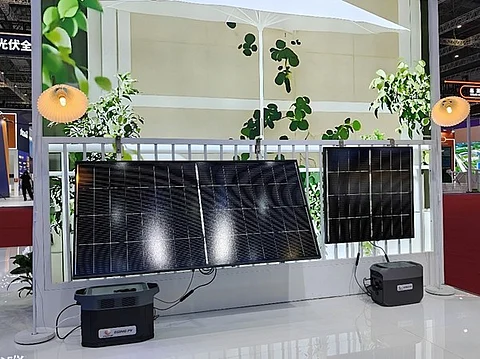

Key takeaways:
EGING introduced smaller 132 W and 264 W modules aimed at improving rooftop space utilization in Europe
Balcony solar solutions include both grid-tied systems with microinverters and off-grid plug-and-play options
The company showcased a steel-frame module as a sustainable alternative to aluminum-framed modules at SNEC 2025
China-based solar PV manufacturer EGING PV showcased several products at its booths in Intersolar Europe and SNEC 2025, held in May and June 2025, respectively.
For the European market, the company presented its Europe-focused product portfolio at Intersolar Europe 2025. The company presented 2 newly designed formats under its residential module series. The 2 new products feature smaller dimensions and module power outputs: 132 W (810 × 766 × 30 mm) and 264 W (1,542 × 766 × 30 mm). EGING claims these panels offer space efficiency by increasing rooftop area utilization compared to higher-power residential modules.
The company also presented standard bifacial TOPCon modules for utility applications and BC module based on TOPCon architecture (TBC) for commercial applications, along with modules for offshore installations. Notable among these products was the bifacial-designed double-glass TOPCon module based on a 182 mm wafer. With a glass thickness of 1.6 mm, the product appears to be designed for balcony solar applications, where 1.6 mm glass is a common feature, because of its light weight.
At SNEC in Shanghai, EGING exhibited modules for residential, C&I, and utility applications featuring advanced technology improvements such as edge passivation, rear-side polyfingers, and zero busbar (ZBB) design. The company highlighted a module with a steel frame that offers a cheaper and potentially more sustainable alternative to aluminum. However, no EGING PV products available in the market currently feature a steel frame.
For balcony solar, the company presented both grid-tied and off-grid solutions. The former is targeted at energy-sufficient households interested in income-generating PV installations. In this case, EGING offers a microinverter combined with energy storage, which it claims to enable self-consumption and excess power feed-in. The off-grid solution is designed for plug-and-play installation, with the lower-power 132 W or 264 W modules offered to allow easy balcony setup.
